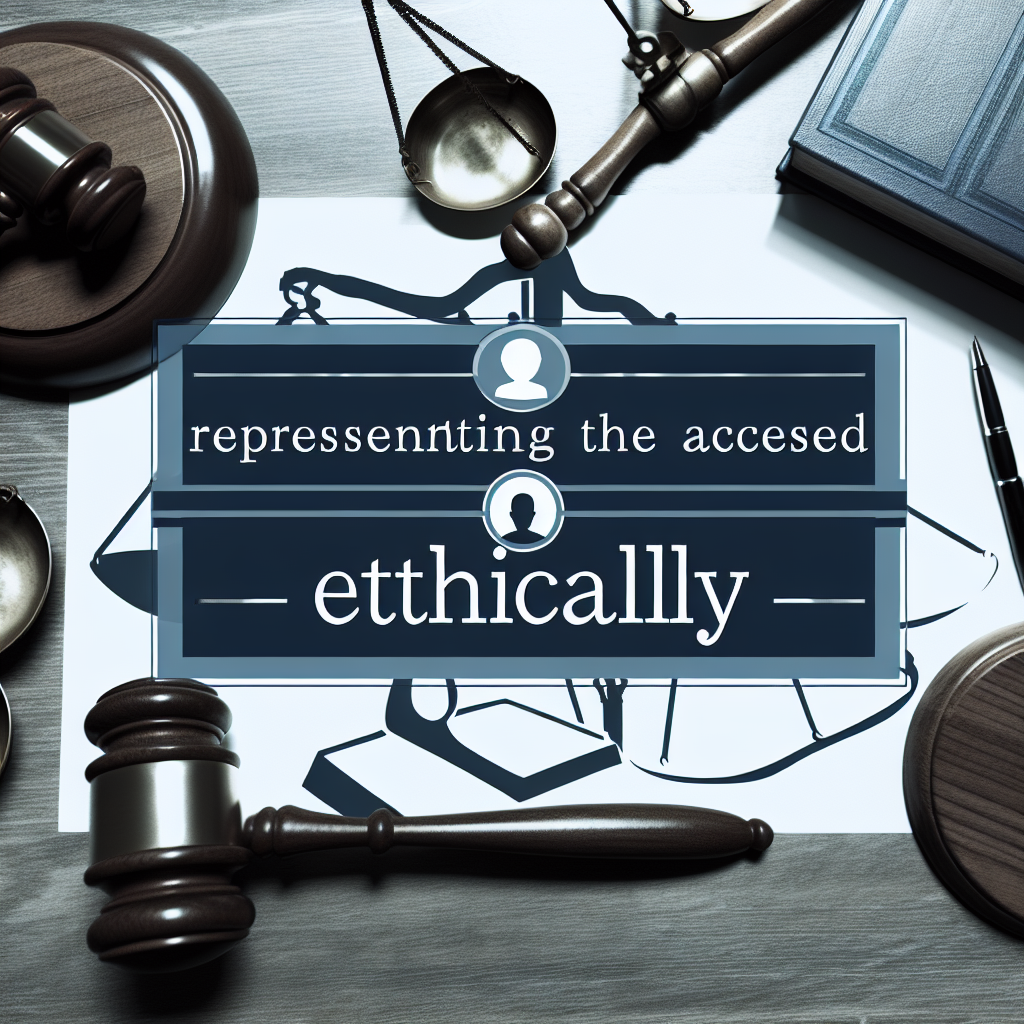
Criminal Defense Ethics: Representing the Accused Ethically
Understanding Criminal Defense Ethics in Legal Practice
The realm of criminal defense is fraught with moral dilemmas and ethical challenges, as legal practitioners navigate the complexities of representing clients accused of crimes. At The Consultant Global, we recognize the importance of ethics and compliance in ensuring fair representation while upholding the integrity of the legal system. In this article, we delve into the principles of criminal defense ethics, the responsibilities of legal counsel, and the methodologies for representing the accused ethically.
The Role of Criminal Defense Attorneys
Criminal defense attorneys carry the weight of ensuring that their clients receive a fair trial, regardless of the allegations against them. This fundamental principle reinforces the legal tenet that everyone is innocent until proven guilty. The ethical responsibility of criminal defense lawyers extends beyond mere representation; it encompasses the duty to advocate for their client’s rights while adhering to the regulations and standards set forth by the law.
Core Ethical Principles
Criminal defense attorneys must embody several core ethical principles:
- Confidentiality: Attorneys must keep all communications with their clients confidential, thereby fostering trust and open dialogue.
- Competence: Lawyers must maintain a comprehensive understanding of criminal law and the courts to provide informed representation.
- Conflict of Interest: Counsel must avoid situations where personal or professional conflicts could compromise their ability to represent their client effectively.
- Zealous Representation: While maintaining ethical boundaries, attorneys are expected to defend their client’s interests with vigor.
Legal Responsibilities and Ethical Guidelines
The intersection of ethics and legal responsibilities is critical for criminal defense lawyers. According to various ethical guidelines, attorneys must adhere to not only the letter of the law but also the spirit of justice.
Duty to the Court
Prosecutors and defense attorneys alike have an obligation to uphold the honor of the court. Criminal defense lawyers must avoid misleading the court, present evidence truthfully, and refrain from making unwarranted claims. This duty extends to preventing the use of illegal evidence and preserving the rights of all parties involved.
Understanding the Limits of Advocacy
While it is incumbent upon defense attorneys to advocate for their clients, delineating the boundaries of this advocacy is crucial. Counsel should not permit clients to lie, and it is their duty to ensure that false information is not presented in defense. In instances where a client admits guilt, attorneys must navigate their defense strategy with tact, potentially advising clients to take a plea deal rather than pursuing a defensible position that could lead to further legal repercussions.
The Role of Compliance in Representing the Accused
Compliance plays an integral role in criminal defense, shaping how attorneys conduct their work and maintain ethical standards. Compliance programs and frameworks help law firms ensure that high ethical standards are upheld across all levels of practice.
Establishing an Ethical Culture
Creating an ethical culture within a law firm is fundamental to the representation of clients. By fostering an environment of integrity and accountability, attorneys are empowered to navigate the tricky waters of criminal defense more effectively. This culture begins with proper training, the establishment of ethical guidelines, and a commitment to ongoing compliance education.
Working Within Regulatory Frameworks
Legal practitioners must be intimately familiar with the regulatory frameworks governing criminal defense in their jurisdiction. The U.S. Department of Justice provides numerous resources to help attorneys align their practices with ethical standards. In the UK and UAE, legal frameworks similarly emphasize the importance of ethical representation and compliance as cornerstones of legal practice.
Incorporating International Perspectives
The landscape of criminal defense ethics is continually evolving, shaped by diverse cultural views and legal structures. In the UAE, ethical considerations in criminal defense might involve additional layers of compliance with local laws and customs. Understanding these variations is crucial for firms operating in a multicultural environment.
Ethics in Cross-Cultural Representation
At The Consultant Global, our extensive experience in multicultural environments enables us to navigate the complexities of criminal defense ethics across various legal systems. Our fluency in multiple languages, including English, Turkish, Azerbaijani, Russian, and French, enhances our ability to serve clients in the GCC and the UAE with sensitivity and expertise.
Best Practices for Ethical Representation
To ensure that criminal defense attorneys can effectively represent the accused while maintaining ethical standards, best practices should be instituted, including:
- Continuous Education: Attending workshops and training sessions to remain current on legal ethics and compliance practices.
- Mentorship Programs: Experienced attorneys can mentor new lawyers, providing guidance on ethical decision-making.
- Clear Communication: Regular discussions about ethical dilemmas within the firm to foster a culture of transparency.
- Frequent Self-Assessment: Regularly evaluating personal practices against established ethical standards.
Why Choose The Consultant Global?
The Consultant Global is uniquely positioned to offer superior consultancy services, including support in criminal defense ethics. Our embedded values ensure we provide the highest levels of ethical representation, backed by extensive and unique experience across international, governmental, and private sectors.
Our commitment to serving clients ethically is reflected in our diverse and skilled workforce, enriched by various cultural perspectives. With a deep understanding of the differing norms across the GCC and wider business environments, we tailor our approach to every client’s specific needs. As we strive to grow globally, our goal remains steadfast: to be your trusted advisor who puts your interests first.
Conclusion
Criminal defense ethics are not merely a guideline but a fundamental requirement in legal practices. By prioritizing ethical representation, maintaining compliance with legal frameworks, and understanding the cultural nuances involved in defense work, lawyers can navigate the demanding landscape of criminal defense with integrity. At The Consultant Global, we remain committed to upholding these high standards while providing exceptional advisory services to our clients.




Leave a Reply